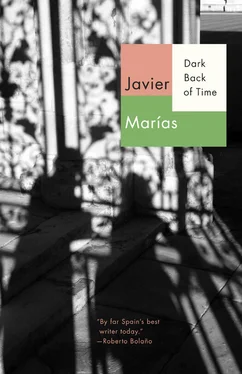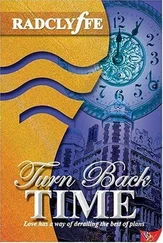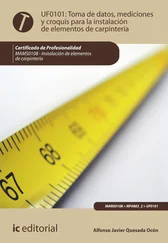John Rutherford, who was at that time translating the nineteenth-century Spanish novel La Regenta , which had yet to be published in English, spoke Spanish with a strong Galician accent acquired from his Galician wife and his unvarying summers in Ribadeo: a quiet, patient and worthy man, a magnificent person, with perhaps a touch of unconfessed resentment that even he himself did not grasp. Seen from outside, his life — the whole family playing musical instruments, daughters he sang with at home — seemed idyllic. It was unlikely that anything would anger him, but there could be a certain danger in him: no one is ever entirely resigned, not even to what he chooses.
Then there was Philip Lloyd-Bostock, who died not long after I left Oxford; during my two years there he was often absent because of his illness, but not enough to keep us from seeing one another and giving a few classes together, shoulder to shoulder, as I had occasion to do, one term or another, with each of my colleagues in turn, classes in practical literary translation, in both directions, Gómez de la Serna and Valle-Inclán into English and Woolf and Hopkins into Spanish. Lloyd-Bostock gave the impression of belonging to another world and only passing through Oxford, quite against his will, in order to earn his salary; this set him apart from the others who were visibly assimilated, more or less, to the city and its life of placid valor, if one can put it that way. Some of them may not have had any other life, not when they went home to their houses or rooms at the end of the day nor even during the long summer vacation, though it surely afforded them sufficient time to become their opposites or Hydes — I’m sure Philip took advantage of the opportunity. Some of them must have waited impatiently for the beginning of each new school year in order to feel centered again, sustained, in harmony with their surroundings, justified. For Philip Lloyd-Bostock, however, this world seemed no more than a nuisance, something out of the past to which a certain amount of attention must still be paid, or to which we can turn without embarrassment in case of need because it will always be on our side — in reserve, like the family we come from, perhaps. But perhaps it’s only that I knew him when he was already very sick, to those who are dying, everything may start to appear superfluous and already past or gone. He had a carefully groomed moustache and watery blue eyes and exhibited a no doubt deceptive docility — that of a person so tortured he’s beyond arguing, or maybe nothing matters to him. Some people wanted to recognize him in the character I called Cromer-Blake, probably because of the double surname and because that character died at the end of the book. Of course Cromer-Blake was also identified with my living and single-surnamed friend Eric Southworth, so in this case, absurdly, two different men were identified with one character.
Eric Southworth: a person of fanatical nobility, so loyal and upright that most of those around him must find it irritating, there aren’t many people like that now, maybe a few women. And at the same time he was an easygoing man of extraordinary wit, one of those rare individuals capable of gravity and jest in the same paragraph, so to speak, and sincerely. I’ve seen him hooting with laughter like a wayward schoolboy over some piece of tomfoolery — an old-fashioned, grandfatherly word, but the right one — and I’ve also seen him adopt the grave and fearsome mien of a hero of the lecture hall. His Spanish was good, if a touch Renaissance-sounding because of its bookish origins; he couldn’t be bothered to speak it there, in the chambers and dining rooms and hallways of Oxford. He was a few years older than I am and his hair was already grey; he used it to inspire the students with respect, though not always successfully, his readily mirthful side betrayed him. He did panic them sometimes, though, when he donned his clerical cap for their oral exams, playing a malevolent character out of Dickens or imitating the exhortatory demeanor of old-fashioned Spanish ecclesiastics — index finger raised, eyes narrowed, voice muted — which amused him a great deal, Catholicism as folklore. Once he asked me to pick up a bishop’s or archbishop’s biretta for him on calle de Segovia, so I sent him two, one made of silk with a green tassel and the other of satin with a red tassel (or vice versa, I don’t know much about such vestments, perhaps they were meant only for a parish priest). He was very enthusiastic about these gifts, though I didn’t ask and don’t know why he wanted them, I imagine he’ll make some private use of them. He gave me no cause for concern with respect to the novel, nor did Ian Michael; both men were overflowing with sharp wit and devilry and had sound knowledge of fiction. Toby Rylands shared these characteristics, but he was more venerable and less predictable, and when I spoke to him about the book I was really confiding my fears as to his possible reaction.
He gave me another of his sidelong glances and what he then said, with some sarcasm, was enough to calm my fears. “I don’t think you need worry about that, Javier. But perhaps about the opposite case. It’s more likely that those who may feel upset or offended will be the ones who don’t recognize themselves in your novel and think they don’t appear in it, not even camouflaged or in disguise, vilified or ridiculed. In the end, it’s more humiliating not to be a source of inspiration than to be one, not to be considered worthy of fiction than to be worthy, even at the cost of some indiscretion, or of appearing in a bad light as the inspiration for some depraved or absurd character. The worst thing is not to figure in a book at all, when there was a possibility of doing so.” He broke off for a few seconds and gazed at the river as if keeping an eye on it, then added with kindly mockery, tapping his craggy fingers on the arm of his foundering deck chair, “Besides, who knows, you could be writing a future classic. All the work we scholars do is condemned to being outdated, unusable, forgotten. That goes for those of us who write; those who don’t, like Eric … well, his knowledge is scattered to the winds as soon as he leaves the classroom, or even before then, you know that, Eric, you know, don’t you?” Yes, Eric knew perfectly well, he knows it and that’s how he wants it. “It may be that the only way we’ll reach posterity is in a contemporary novel we have no reason to pay the slightest attention to. Can you imagine? How unjust, how grotesque, what a cruel joke. Remembered for what we disdained. That’s how it is, that’s how it is. It seems unlikely that any contemporary novel will last. Too many are published and the newspaper critics have almost no discernment, but it’s possible, at least. What most assuredly will not endure is our research and our explications, which could only be of interest to our future archeological selves — how should I put it? — to a repeat version of ourselves that isn’t going to happen. Not even our increasingly impersonal and superfluous erudition will last, with these computers that steal it and devour and store everything and then release it to the first illiterate who knows how to push a button. Hmm. I don’t like it.” Rylands plunged a hand into the white meringue of his hair, without mussing it, as if trying to protect his archaic brain from this glimpsed future that was paining him, where there would be no place for anyone like him — and surely he had resigned himself to that — but neither would there be a place for people like Ian, who was younger, or Eric, still younger, and both with many active years ahead of them, and this must have struck him as too violent, an amputation or a sacrifice. “I don’t like it. Hmm. Even now, these texts of ours, crammed with laborious notes and exegeses, aren’t read much; most of their readers are resentful colleagues who read them with ill will, to object to or belittle them, or plagiarize them if we’re lucky. To disparage us while we’re alive, once we’re dead it’s not worth the trouble. So what you must do is try not to leave any of us out of your novel; you could be depriving one or another of us of immortality — unforgivable, don’t you agree? It seems to me that all you need fear is the fury of those you’ll be leaving without a literary posterity. Ta-ta-ta. Can you imagine? People like us, a century hence, doing research on the people we are now. Ta, ta, ta.” Rylands often laughed at his own quips.
Читать дальше












